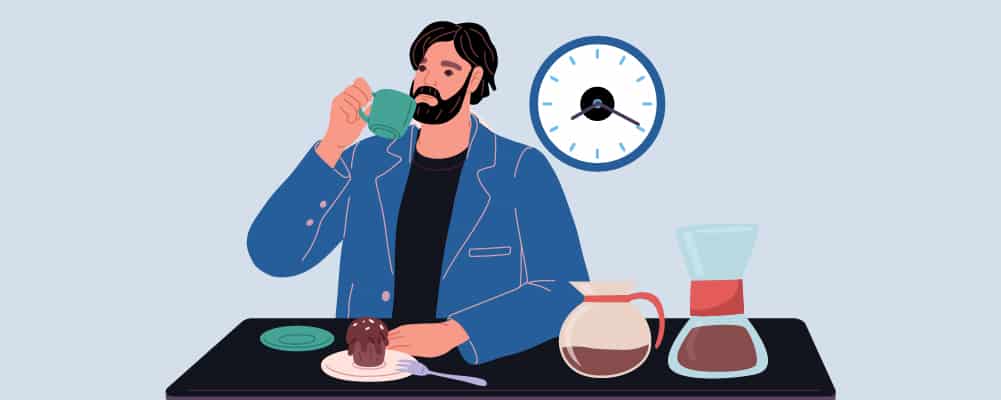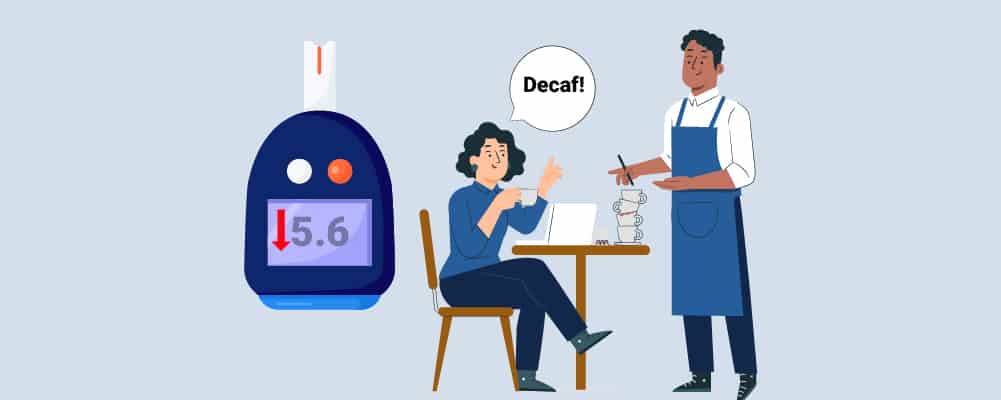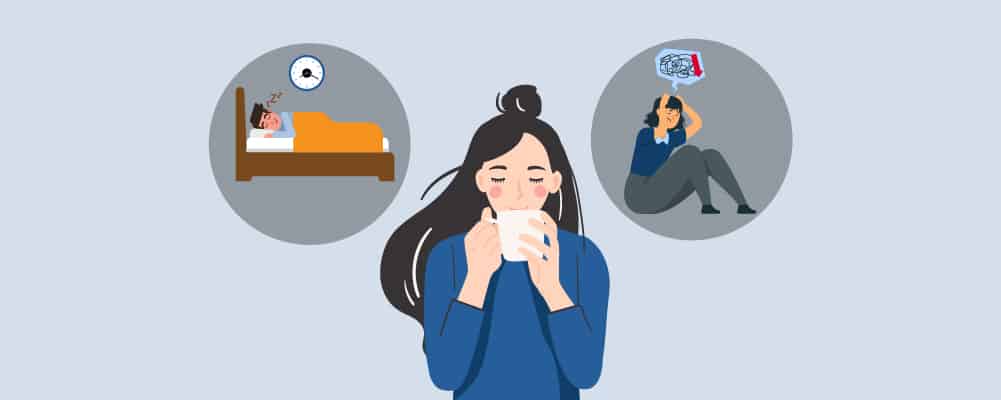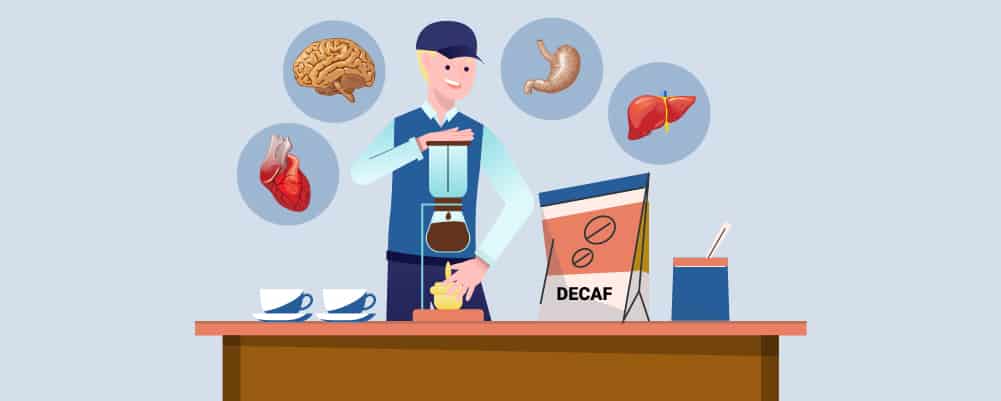The Benefits Of Drinking Decaf Coffee
Iced coffee, espressos, Frappuccino, mocha, and more. Coffee is an incredibly diverse beverage choice that stands out for offering a complete variety of drink choices.
You can get your coffee to go, or in an oversized cup and enjoy the world passing by. You can also choose a hot, cold, or blended beverage depending on your personal preferences or the type of weather.

Enjoying a hot drink on a cold day is something that so many of us yearn for, especially when it comes to winding down for the evening.
There is a distinct taste that comes from coffee which creates a rich aroma as well as a tasty and versatile beverage. However, coffee has a relatively high caffeine content.
This means that it is less appropriate for enjoying towards the end of the day, as it can affect your sleeping pattern. In order to create healthier sleeping habits in the long run, many people prefer to drink decaf coffee.
This is simply coffee which has been through additional processing to considerably reduce the caffeine content.
Enjoying a tasty coffee at the end of a long day, or even after a meal is considerably easier when you are enjoying decaf coffee.
Here is a look into the benefits that drinking decaf coffee can have on your health overall as well as your lifestyle.
What Is Decaf Coffee?

Before we get started, it is important to understand the type of coffee and other products we are discussing. The term decaf is a common abbreviation of the word decaffeinated.
Decaf coffee refers to any coffee beans, ground coffee, or beverage that has been processed the exact same way that regular coffee will be processed and prepared.
However, the biggest difference between regular coffee and decaf coffee is that decaf coffee is processed more than regular coffee in order to remove the caffeine.
This process is known as decaffeinating, and it can be challenging depending on the form that the coffee is in.
For many, decaf coffee is a great alternative to regular espresso coffee beans because it allows them to enjoy the drink which is commonly known as a social lubricant, without missing out on hours of sleep.
Caffeine can contribute to heart palpitations, anxiety, and even digestive problems if too much is consumed. Because of this, many people choose decaf coffee to make these symptoms considerably easier to manage.
How Much Caffeine Is In Decaf Coffee?
Something that is important to acknowledge is that decaf coffee still contains a very small percentage of caffeine. However, this is considerably less than other beverages, such as regular coffee and black tea. In general, most decaf coffee has had around 97% of the caffeine removed.
This leaves 3%, but the estimated amount of caffeine per cup of decaf coffee varies. While a regular cup of coffee can vary in terms of caffeine content depending on the type of drink from 70-140 mg, a cup of decaf coffee contains between 0 and 7 mg of caffeine.
Even though decaf coffee is not completely free of caffeine, there is a significant reduction in the amount of caffeine per cup. This is less likely to lead to the coffee jitters and anxiety if you experience this with regular coffee.
Because of this, decaf coffee may actually help with improving your wellbeing. Even if this means switching one of your daily caffeine hits with a decaf alternative.
In the long run, it is far less likely that you will experience a crash in energy levels during the day. This means that decaf coffee can help you to enjoy the tasty beverage without relying on caffeine on a daily basis.
While coffee is widely considered a healthy beverage for digestion, gut health, and regulating metabolism, it is a powerful stimulant that can impact your heart rate and blood pressure.
This means that coffee can impact your energy levels, and is less suitable for many people who suffer with long-term health conditions.
Decaf coffee provides a slightly healthier alternative for these individuals. This is because there is a lower amount of caffeine in decaf coffee. It can help people to enjoy more consistent levels of energy throughout the day, without suffering from an increased heart rate, and making certain conditions worse.
These include anxiety and panic attacks, as well as neurodegenerative diseases like Parkinson’s and dementia.
How Is Decaf Coffee Made?

The coffee goes through additional processing in order to remove the caffeine. Decaffeinating can happen in several different ways.
These include soaking the coffee beans in an organic solvent until the caffeine has been removed before washing away the solvent.
Other methods which are commonly used for decaffeinating coffee beans include chemicals such as methylene chloride and ethyl acetate. Most manufacturers use these with water to remove the caffeine, which can make the process faster without getting rid of other compounds including the sugars and protein.
Another method for decaffeinating coffee is known as the Swiss Water Process. This process uses carbon dioxide or a charcoal filter to remove the caffeine from coffee. Most of the time, coffee is decaffeinated before it goes through the necessary processing.
The beans are usually decaffeinated before being roasted and ground. Because of this, decaf coffee has a very similar taste to regular coffee.
In fact, most people struggle to notice any difference. Those with a more experienced palate may notice a slight reduction in acidity which decaf coffee has.
This is due to the decaffeinating process which reduces the acidic taste of regular coffee. However, the difference in taste is very slight, which is why most people tend not to notice any difference when it comes to the taste and aroma of decaf coffee.
Although most manufacturers typically remove the caffeine from coffee beans before roasting and additional processing, recent developments have suggested that it can be faster to extract the caffeine with roasted coffee beans.
Health Benefits of Decaf Coffee
So what can switching to decaf coffee do for you? Because there are a range of health benefits, some of the main ones have been addressed below. Consider the types of conditions you experience, and how integrating more decaf coffee can help with those.
It is not uncommon to experience coffee jitters, which can be caused by the high caffeine content in most coffee drinks. In some cases, this can make certain health conditions more difficult to manage. These include anxiety disorders, and other cognitive illnesses.
Here are some of the health benefits to expect when you switch to decaf coffee, or if you want to switch one of your regular coffees during the day with decaf.
Decaf Coffee May Help Lower Risk Of Type 2 Diabetes

Type 2 diabetes can be caused by being overweight, or generally poor eating habits. It can make it very challenging to manage your blood sugar levels, because the insulin production from the pancreas is limited for someone who has type 2 diabetes.
There is, however, some evidence to suggest that drinking decaf coffee on a regular basis can provide some level of protection against this condition. If you have a family history of type 2 diabetes, then it is worth integrating more decaf coffee into your diet if possible to prevent its development.
Because decaf coffee has slightly less potent aroma and less of a bitter taste, there is less need for additional sweeteners. Because of this, as well as the general benefits of regular coffee, it can help reduce your risk of developing type 2 diabetes.
This is believed to be caused by the presence of polyphenols in coffee, which is a crucial antioxidant in the body. Whether you choose to switch from regular coffee to decaf or if you want to integrate more decaf coffee into your diet, it can help protect your body from type 2 diabetes.
There is also evidence to suggest that a higher amount of coffee can increase someone’s cafestol and caffeic acid production in their body. This has been known to increase insulin production, which is instrumental in managing blood sugar levels.
Even though both of the protective chemicals have names that are similar in sound to caffeine, decaf coffee provides these just as effectively. Because of this, drinking decaf coffee can help reduce someone’s chances of developing type 2 diabetes.
This is by providing additional protection to their body’s insulin production, which allows them to manage their insulin and blood sugar levels naturally.
Less Caffeine Can Improve Sleep And Lower Anxiety

The interaction between caffeine and sleep has been a complex one for many reasons. This is because many people find that their mind continues to be active when they have had caffeine less than two hours before heading to bed. This can be in the form of dark chocolate, tea, or coffee.
Even when the body is exhausted, it can be difficult to fall asleep when there is a high amount of caffeine in your system. This has been known to lead to anxious thoughts and an overall negative effect on your mental health.
Overthinking is easily done when caffeine is involved, and it can be even more likely when you are laying in bed trying to sleep while everyone else is resting peacefully. This intense feeling of loneliness can also have a negative impact on your mental health on the whole.
Because of this, many people who suffer from anxiety and panic attacks should pay close attention to the impact that caffeinated beverages have on their mindset. Switching to decaf coffee can help you to get a good night’s rest frequently, as it can help reduce bouts of insomnia when you are limiting your caffeine consumption.
Decaf Coffee Contains The Same Antioxidants In Regular Coffee
Antioxidants are a crucial part of many people’s diets, and coffee has a very high amount of them in each cup. Antioxidants may help support the body’s immune system, and allow the body to remain healthy.
While the consensus isn’t universal, this is because antioxidants may have positive benefits according to science.
Enjoying decaf coffee can allow you to benefit from the same antioxidants and health properties of regular coffee without experiencing that jittery feeling. There is a slightly lower amount of antioxidants in decaf coffee compared with regular coffee.
However, there are still a range of benefits that come with drinking decaf coffee. The potency of antioxidants is still worth drinking, and it can be useful for someone who is drinking coffee purely for health reasons.
Switching To Decaf Helps To Aid Weight Loss

Another health benefit that decaf coffee can have is that it may helps with weight loss. Like regular coffee, there are chlorogenic acids present in decaf coffee.
These are also antioxidants that support the body to reduce the production of fat cells by managing how the body uses glucose. This is done by managing the liver’s production and use of enzymes.
In turn, this can help with weight loss because it will make you feel fuller for longer. Not only that, but decaf coffee can help you to reach a healthy weight by enabling better sleep on a regular basis. This is because of the lower chance of experiencing insomnia.
The body needs sleep in order to regulate metabolism and manage digestion. Because of this, drinking decaf coffee can help someone to lose weight. Decaf coffee typically has fewer calories than regular coffee as well, which makes it an ideal choice for someone wanting to lose weight.
Decaf Coffee Helps Protect Telomere DNA Length
Telomeres are complex mechanisms within our DNA that are usually seen at the end of a chromosome structure. They protect chromosomes from getting damaged or tangled, and healthy telomeres are known for preventing the onset of degenerative diseases to the brain and body.
Because of this, telomeres play an important role in the aging process on the whole. This is because the length of telomeres has been known to shorten over time as the body gets older.
In general, shorter telomeres are linked with an increased risk of diseases and conditions within the brain that are associated with aging. These include Parkinson’s and Alzheimer’s disease, which are associated with cognitive decline in general.
Several studies have suggested that an increased consumption of caffeinated beverages such as coffee can shorten a person’s telomeres within their DNA. Because of this, switching to decaf coffee has potential to protect the length of your telomeres and to avoid certain conditions associated with shorter telomeres.
Decaf Coffee Can Reduce The Severity And Regularity Of Acid Reflux Flare-Ups
Because lightly roasted coffee is a pretty strong, aromatic beverage, it is no surprise that it can contribute to acid reflux flare-ups.
For many, this is an extremely uncomfortable feeling that is difficult to ignore. Heartburn can be intense, and it is known to worsen when you drink coffee.
Interestingly, decaf coffee can help with this. It has a lower acidity level on the whole, which means that there is a reduced risk of experiencing heartburn. If you suffer from heartburn or acid reflux more frequently, then it could be worth paying a little more attention to the food and drink that you consume.
Decaf coffee is ideal for someone who wants to monitor their intake of acidic drinks or snacks, because there is a lower chance that you will experience acid reflux.
If you are someone who suffers with acid reflux or heartburn after eating on a regular basis, it could be worth cutting out foods that have a higher amount of acid in them.
These include citrus, any type of vinegar, carbonated drinks like soda, chocolate, tomatoes, as well as anything that has a very high amount of sugar. These can all affect the pH of your gut, and cause an uncomfortable feeling of heartburn.
By cutting out these as well as switching to decaf coffee, you can take control over the health of your gut and pay more attention to how your body feels at any given time. Likewise, you can enjoy fewer instances of heartburn and general discomfort in your digestive system.
Decaffeinated Drinks May Be Better For Your Heart

Of course, caffeinated drinks can have negative effects on your heart health. This is because it is a powerful stimulant used by many on a daily basis. It can also make certain heart conditions worse over time, which is why some people choose to avoid caffeine for health reasons.
Consider switching to decaf if you have a family history of heart disease and other conditions, because it can protect your heart a little more than regular coffee can. The lower content of caffeine allows you to enjoy the taste of coffee without causing significant damage to your heart.
Likewise, there is evidence to suggest that switching to decaf coffee can reduce cholesterol in your body. This means that there is less of a significant risk of heart disease caused by cholesterol in the arteries.
Because chlorogenic acid can reduce fat storage in the liver, it can reduce the amount of bad cholesterol in the body by limiting its production.
You Can Drink Coffee All Day Without Overloading Your Caffeine Intake
Similarly, the reduced content of caffeine found in decaf coffee means that you can enjoy your favorite drink all day long. There is less need to monitor how many drinks you are having or ordering when you choose decaf coffee. This means that you will not need to substitute certain beverages or alternatives.
Coffee is an incredibly versatile beverage that can be served hot, cold, over ice, with chocolate, and more. The ways in which coffee can be made are seemingly endless, and choosing decaf coffee can allow you to continue enjoying these options.
By enjoying decaf coffee, it also means that you do not have to stop enjoying your favorite beverage at any time of the day. This is because there is less of a concern associated with sleeping at night, due to the very low caffeine content. You can avoid insomnia without restricting yourself when it comes to decaf coffee.
For many, being able to enjoy a cup of coffee at any time of the day without worrying about the consequences can be a considerable relief. It can allow them to thoroughly enjoy each cup, and ensure that they are getting what they want out of the beverage.
Most people do not have to limit themselves to a set number of cups per day when it comes to decaf coffee. This means that they can enjoy the social benefits of drinking coffee without suffering some of the consequences of consuming more caffeine.
There Are Plenty Of Healthy Vitamins In Decaf Coffee
In addition to the high antioxidant content found in coffee, decaf coffee has a range of vitamins that are essential for a healthy diet and lifestyle. In one cup of decaf coffee, you can receive magnesium, potassium, and vitamin B3.
Magnesium is essential for the body to manage energy levels, muscle, and nerve function as a whole. By drinking a cup of decaf coffee each day, you are giving your body a boost of magnesium which is needed to keep yourself fueled during the day.
Potassium is responsible for regulating the fluid levels within the body. It can also help maintain normal blood pressure, and help the muscles to contract.
Vitamin B3 is one of the essential vitamins found within most diets. It can help to keep the nervous system healthy as a whole, and keep the skin and hair healthy.
If you are someone who suffers from frequent illness or who struggles to nourish their bodies correctly, then it could be worth integrating decaf coffee into your routine or diet.
This is because you can access a range of vitamins which are essential for protecting the muscles and maximizing cell function on the whole.
Related Reads: Kona Coffee, Blue Mountain Coffee, Low Acid Coffee
Decaf Coffee Contributes To Better Brain Health

In general, coffee has been linked with decreasing someone’s risk of developing neurodegenerative diseases. There is also evidence to suggest that regularly consuming decaf coffee can protect the neurons in the brain just as much as regular coffee can.
This means that some of the benefits of coffee are not lost when it comes to switching to decaf.
Of course, understanding how the brain functions is an incredibly complex issue. It can be challenging to recognize which conditions are more likely in certain individuals, as well as genetic predisposition.
However, there has been some evidence that links decaf coffee with improving energy metabolism in the brain.
Somebody with a reduced or impaired energy metabolism in the brain is believed to have a much higher risk of developing cognitive impairments. These include Alzheimer’s and other conditions associated with aging.
While decaf coffee does not necessarily stop this from happening, it has been proven to help protect the brain from cognitive decline.
Consider switching to decaf coffee if you want to protect your brain from certain conditions. Regular coffee provides similar benefits in the brain, although it is not recommended for people who have a higher risk of heart disease, stroke, or other conditions caused by high cholesterol and blood pressure.
Pregnant Women Can Drink Decaf
Another benefit of decaf coffee is that it can be enjoyed by pregnant women. Regular coffee is known for raising someone’s heart rate and blood pressure. Because of this, it is not recommended for pregnant women because it can impact their baby’s development.
Everything that a pregnant woman eats or drinks is passed to their baby through the placenta. Because of this, most doctors urge pregnant women to avoid caffeine and coffee in general so that their baby is able to grow properly, and so that they can avoid any complications involved during childbirth.
Most pregnant women avoid caffeine because it can take longer for their bodies to digest it correctly as they are carrying a baby.
Because of this, decaf coffee provides an ideal alternative. This is because the caffeine content is minimal, and it can help satisfy a pregnant woman’s cravings without impacting their baby’s development.
Because some commercial brands which claim to be decaf actually have a high caffeine content, it is important to take a closer look at the product packaging in order to be safe.
However, drinking decaf coffee in general is ideal for pregnant women. This is because it is unlikely to exceed the recommended 200 mg maximum intake of caffeine per day.
Decaf Coffee Is Better For Your Bladder
It is common knowledge that caffeine can make you become dehydrated. This is because it is known as a diuretic, which makes you need to urinate more frequently.
It can cause you to lose more bodily fluids than normal, which means that you can become dehydrated when you consume a caffeinated drink such as coffee.
Caffeine in general is known to have this effect on the body because it increases blood flow to the kidneys. Although one or two cups of coffee each day is unlikely to make you become severely dehydrated, it could be worth switching to decaf if you struggle with managing your bladder.
Because the majority of caffeine has been removed from decaf coffee, there is a much lower chance that you will need to urinate as frequently.
This means that you are less likely to become dehydrated, and your body can manage fluid levels more efficiently. Because decaf coffee does not have diuretic effects, it can be an ideal way to keep yourself hydrated during the day.
Limitations Of Decaf Coffee
Even though decaf coffee enables many people to enjoy coffee within a range of different scenarios, there are some limitations of the aromatic beverage.
In some people, drinking higher amounts of decaf coffee has potential to raise their levels of bad cholesterol.
Because of this, it could be worth speaking with family members about the likelihood of developing severe heart conditions. Similarly, decaf coffee does contain small amounts of caffeine.
It has not been completely removed from the beans. It is therefore worth avoiding if you are more sensitive to caffeine in general.
Each body works differently, and it is essential that you are thinking about your personal health and current state of mind. This can allow you to be more mindful about the type of food and drink you are consuming each day.
On the other hand, decaf coffee is an ideal solution for pregnant women, and in addition to a healthy lifestyle on the whole.
Because of this, decaf coffee is an incredibly versatile product that is certainly worth trying out for yourself. It can be made into a range of unique beverages, and prevent you from becoming dehydrated.
Summary

Decaf coffee is a highly versatile beverage that has as many possibilities as regular coffee does. It is made by putting the coffee beans through a decaffeinating process which involves soaking them in a water-based mixture before grinding them or roasting.
For many, caffeine can make certain conditions worse. These include cognitive decline, and a predisposition to heart disease.
Swapping to decaf coffee on a regular basis can help with this, because it allows people to avoid feeling anxious or suffering from insomnia when they have had too many cups of coffee during the day. Likewise, decaf coffee allows more flexibility for pregnant women and people who want to avoid heart conditions.
Another significant benefit of decaf coffee is the protective features which it can provide in the body. These include strengthening telomeres on DNA strands, protecting the brain from certain age-related diseases, and preventing the body from developing type 2 diabetes.
Of course, decaf coffee still contains very small amounts of caffeine. However, it is considerably less than the amount of caffeine found within a regular cup of coffee. Consider integrating more decaf coffee into your diet to start enjoying the positive effects that it can provide.
From improving bladder control to protecting the brain from certain conditions, decaf coffee has a very similar, if not identical, taste and aroma to regular coffee.

